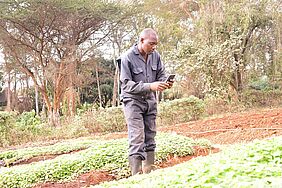Africa is home to thousands of smallholders practising or interested in organic agriculture. Many of them have a growing need for more easily accessible know-how on organic agriculture practices in order to implement knowledge-intensive organic practices. They are often underserved by traditional extension agents. In Kenya, for example, there are over a thousand farmers for each government extension agent. In this context, digital training could reach more farmers, especially those most rural, and increase engagement with advisory services to find solutions to their challenges in the field when farmers need it. To unlock this potential for organic farming, FiBL has joined forces with the Biovision Africa Trust. With the support of the Leopold Bachmann Foundation, the two partners initiated the project, "A pilot on transforming farmer access to organic training materials and information through digitalization".
The pilot project explained
The project makes use of already available training resources such as the African Organic Manual (produced by FiBL & IFOAM) and the Infonet-Biovision, which are tailored to small-scale African farmers. The provided information is transformed into text messages and a smartphone app, making the resources more accessible for farmers.
The project team builds strong partnerships with local actors and FiBL’s engagement in the Global Project Knowledge Centre for Organic Agriculture in Africa (KCOA) project. KCOA, implemented by GIZ (German Society for International Cooperation) and funded by the German Federal Ministry for Economic Cooperation and Development, works with partners to set up a regional network of knowledge hubs on organic agriculture and gathers and disseminates the wealth of information on organic agriculture in Africa.
Over 1,500 farmers profited from training on mobile phones
Together with the local technology providers Yielder and Arifu, FiBL has already created and tested the first digital training in Kenya using two different channels: via SMS messages and hybrid training. The hybrid training brings farmers and trainers together to use a smartphone app for an enhanced learning experience. The app-based hybrid training was developed together with Yielder, where information, videos, animations, and quizzes during in-person training. For the SMS training, FiBL partners with Arifu, who sends short messages about organic farming to thousands of farmers. The messages are divided into modules so that farmers learn in an easy and fun way. The learners follow an exemplary farmer, Beth, throughout her process of becoming an organic farmer. Each module ends with a short test, and farmers are provided with links to resources to learn more. Recently we have also transferred these messages to WhatsApp – making them accessible outside of Kenya.
Over 1,300 farmers were already reached with the SMS training and over 200 with the hybrid smartphone training, and a Facebook ad campaign helped create more buzz around the content. The project team is currently evaluating how the learners assess the training, the benefits they got out of it and what could be improved.
What will be next
We will take our learnings from the first launch of content and the feedback from farmers to guide our next steps. A big next step for the project will be to scale out to other countries in Africa, such as Rwanda. Together with the new partner ROAM – the Rwandan Organic Agriculture Movement – the project team will start training an additional 5,000 farmers. Together with the network of partners, new training on specific value chains will be developed - such as coffee or indigenous vegetables - enhancing the learning experience for small-scale farmers in Africa.
Through this pilot project, important insights are gained on improving farmers’ access to training on organic agriculture and strengthening the uptake of organic agricultural practices on the African continent.
Further information
Contact
- Benjamin Gräub
- Eva Goldmann
Links
- biovisionafricatrust.org: Biovision Africa Trust
- organic-africa.net: African Organic Manual
- infonet-biovision.org: Infonet-Biovision
- giz.de: Centre for Organic Agriculture in Africa (KCOA)




